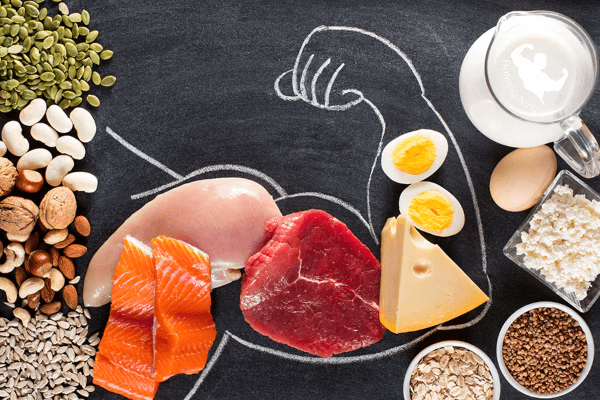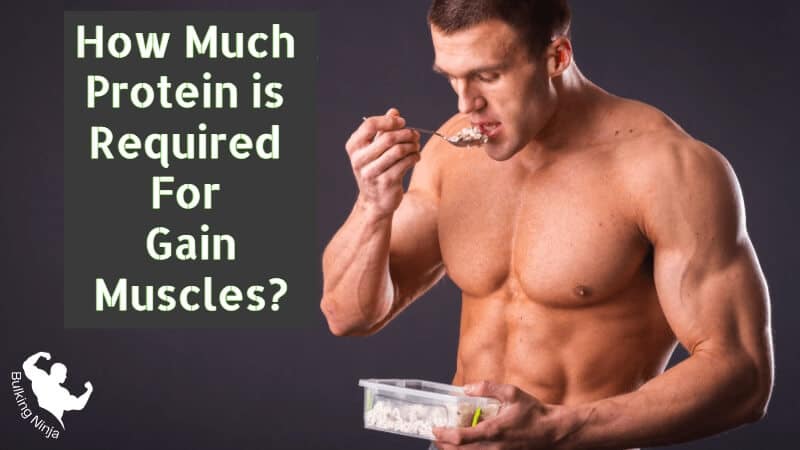If you’ve ever set foot in a gym or taken an interest in fitness, you’ve probably heard that protein is the key to building muscle. It’s a mantra echoed by trainers, bodybuilders, and fitness enthusiasts everywhere. But just you need how much protein is required for gain muscles effectively? It’s a question that has sparked numerous debates and a fair share of confusion within the fitness community.
In this blog post, we’ll delve into the science of protein and muscle growth to help you understand the optimal protein intake for achieving your muscle gain goals.
Whether you’re a seasoned gym-goer looking to fine-tune your diet or a newcomer eager to kickstart your muscle-building journey, we’ll provide you with the knowledge you need to make informed dietary choices and maximize your gains. So, let’s get to the bottom of the age-old question: How much protein is required for gaining muscles?
Table of Contents
- How Much Protein is Required For Gain Muscles?
- How much protein do I need?
- What is your required protein intake?
- Understanding Protein Intake for Muscle Gain
- What are the best protein sources?
- How much protein is too much?
- What are the potential consequences of insufficient protein intake?
- Recognizing the Signs of Inadequate Protein Intake
- Frequently Asked Questions
- How Much Protein Do You Need To Build Muscle?
- Is 100 Grams Of Protein Enough To Build Muscle?
- How Much Protein Do I Need To Build Muscle And Cut?
- How To Get 100g Of Protein A Day?
- High Protein Diet For Muscle Gain?
- How Much Protein Per Meal To Build Muscle?
- How Much Protein Should A Woman Eat To Gain Muscle Calculator?
- How Much Protein To Gain Muscle Female?
- Conclusion
How Much Protein is Required For Gain Muscles?

In the realm of muscle building, protein stands as the foundational pillar. As a seasoned nutrition expert, Dr. Anupama Chawla from Stony Brook Children’s Hospital emphasizes the critical role of protein in wellness and muscle development. Protein, often considered a buzzword in the fitness world, is not only essential but also plays a key role in achieving your muscle-building goals. Research has shown that muscle protein undergoes continuous breakdown in the human body, making the consumption of adequate protein a necessity for muscle recovery and growth.
When we delve into the realm of nutrition labels, it becomes evident that protein content is a primary concern for those seeking to optimize their diets for muscle gain and weight loss. Many individuals are now paying closer attention to the protein content of the foods they consume, recognizing its significance in the pursuit of their fitness objectives. It’s undeniable that protein has gained prominence as a vital component of a balanced human diet. Read more about how to gain muscles from BJJ.
However, it’s crucial to maintain a balanced approach. While the spotlight on protein is well-deserved, experts like Dr. Chawla caution against extremes, such as adopting an all-meat diet. In the world of nutrition and muscle building, balance is key, and both too little and too much protein can hinder your progress. To determine the right protein intake for you, it’s essential to refer to research findings and guidelines established by health experts. The quest for optimal protein consumption is indeed a journey filled with nuances, but with a discerning approach, you can strike the right balance and propel your muscle gain endeavors to success.
How much protein do I need?
it’s essential to consider a variety of factors. The Recommended Dietary Allowance (RDA), as established by nutrition experts like Dana Ellis Hunnes, PhD, at UCLA Medical Center, serves as a valuable guideline. The RDA suggests an intake of 0.8 grams of protein per kilogram of body weight per day.
However, the protein needs of individuals can vary significantly from person to person. In the age of social media and the constant stream of information we are exposed to, it’s easy to believe that we need more protein than we actually do for muscle growth.
Trista Best, a registered dietitian affiliated with Balance One Supplements, emphasizes that this RDA equates to approximately 10 to 35% of our daily recommended caloric intake. This percentage offers a practical perspective on incorporating protein into your diet for muscle gain.
It’s important to remember that more isn’t always better, and finding the right balance of protein tailored to your specific needs is key. By following these daily recommended guidelines and considering your body weight, you can optimize your protein intake on your journey towards gaining muscle and maintaining overall wellness.
What is your required protein intake?

In the pursuit of muscle gain, understanding the recommended dietary guidelines is pivotal. The 2020-2025 Dietary Guidelines for Americans offer valuable insights into the protein needs of healthy adults. These guidelines suggest that most individuals over 19 years old should aim to derive between 10-35% of their daily calories from protein.
Remarkably, a single gram of protein provides four calories, making it an efficient source of energy in our daily lives. For someone consuming 2,000 calories per day, this translates to a daily protein intake ranging from 50 to 175 grams.
The Recommended Dietary Allowance (RDA) of 0.8 grams of protein per kilogram of body weight serves as a foundational measure for maintaining nitrogen balance and preventing muscle loss.
However, it’s important to recognize that this recommendation might not fully cater to active individuals who aspire to build muscle. Achieving the ideal amount of daily protein intake for muscle gain involves considering various factors, including age, gender, activity level, and overall health.
Informed by numerous studies, experts offer valuable insights into calculating the optimal protein intake based on body weight. While these recommendations may not be one-size-fits-all, they provide a solid framework for individuals looking to embark on their journey toward muscle gain. It’s not merely about how much protein you consume; it’s about finding the right balance that aligns with your unique goals and circumstances.
By understanding these guidelines and calculating your protein needs accordingly, you can pave the way for a successful and health-conscious approach to muscle gain. Read more about Oats are best for grow muscles.
Understanding Protein Intake for Muscle Gain
When embarking on the journey to gain muscle, one crucial aspect to consider is the appropriate amount of protein intake. Experts like Hunnes emphasize the significance of this dietary component. The 2020 study, which delves into the intricacies of high protein diets, provides valuable insights. But what exactly constitutes the right amount of protein for muscle gain?
Protein and Body Weight: Finding the Balance
To calculate your protein needs, it’s essential to factor in your body weight. Rose-Flores highlights that consuming more than 2 grams of protein per kilogram of body weight per day may pose potential risks, including kidney dysfunction and unwanted weight gain. It’s crucial to strike a balance tailored to your specific needs, considering factors like age, gender, activity level, and overall health. read more about Body weight exercises.
The Role of Protein Utilization
Understanding how our bodies absorb and utilize protein is key. According to Hunnes, we can only absorb and utilize a certain amount of protein at any given time. Going beyond this threshold leads to excess calories, which can ultimately convert into fat. This underscores the importance of not overloading on protein, as excesses can either go to waste in our urine or contribute to weight gain.Further study about important of Breakfast for gaining muscles.
Balancing Act: Protein and Health
While high protein diets have been a subject of interest, it’s essential to recognize the nuanced perspective. The 2020 study calls for longer clinical trials to delve deeper into the effects of such diets on kidney and bone health. Additionally, the term “high protein diet” can be classified within a range of 1.07–1.60 grams of protein per kilogram of body weight, not a fixed 2 grams.
The Importance of Listening to Your Body
Finally, Best highlights that individuals who consume too much protein for their weight and activity level may experience symptoms like irritability, dehydration, fatigue, and nausea. This emphasizes the need to pay attention to your body’s signals and adjust your protein intake accordingly.
In conclusion, determining the optimal protein intake for muscle gain is a complex yet crucial aspect of a fitness journey. By considering factors like body weight, activity level, and overall health, you can find the right balance that aligns with your goals, ensuring a positive impact on your muscle-building endeavors.
What are the best protein sources?
Selecting the right protein sources plays a pivotal role in achieving your fitness goals. Best and Chawla, both seasoned experts in the field, provide valuable insights into crafting a well-balanced protein-rich diet.
Choosing Wisely: The Healthiest Protein Sources
Best emphasizes the importance of choosing the healthiest protein sources. Lean animal meats such as poultry and fish, along with eggs, are exemplary options. These sources not only provide the necessary protein but also offer a range of essential nutrients for overall health.
Plant-Based Proteins for All: A Balanced Approach
For vegetarians and vegans, plant-based proteins like beans, tofu, and lentils offer an excellent alternative. However, as Best points out, not all plant sources are complete proteins. This means it’s essential to combine various plant foods to ensure you receive all nine essential amino acids required for muscle growth.
Amino Acids: The Building Blocks of Strength
Amino acids, often referred to as the building blocks of life, are essential for muscle development. Best underscores the importance of these essential nutrients, highlighting that animal proteins already contain all nine essential amino acids, making them complete proteins.
In short words, achieving optimal muscle gain requires a thoughtful approach to protein intake. By selecting the healthiest protein sources, whether animal or plant-based, and understanding the role of amino acids, you can craft a well-rounded diet that supports your fitness journey.
Additionally, when considering protein supplements like bars and powders, it’s essential to strike a balance and prioritize overall health for long-term success in gaining muscle and maintaining well-being.
How much protein is too much?

When it comes to protein intake, the adage “everything in moderation” holds true. While protein is essential for muscle growth and overall health, consuming too much can have negative consequences. The ideal protein intake varies from person to person based on factors such as age, gender, activity level, and overall health. However, exceeding recommended limits can lead to several issues.
Firstly, excessive protein intake can strain the kidneys, potentially causing kidney dysfunction, a condition known as azotemia. This places unnecessary stress on these vital organs and can lead to health complications over time.
Secondly, consuming more protein than your body needs can result in unwanted weight gain. Protein provides calories just like carbohydrates and fats, and excess protein calories are stored as fat in the body. So, if your protein intake significantly exceeds your requirements, it can lead to an increase in body fat.
Furthermore, very high protein diets, typically exceeding 2 grams of protein per kilogram of body weight per day, may be associated with an increased risk of osteoporosis. This is because excessive protein intake can lead to increased calcium excretion through urine, potentially weakening bones over time.
In addition to physical health concerns, consuming too much protein can have adverse psychological effects. It can lead to irritability, fatigue, and even nausea. Therefore, it’s crucial to strike a balance and avoid overloading on protein.
What are the potential consequences of insufficient protein intake?
In the United States, where dietary diversity and ample calorie intake are common, it’s highly likely that individuals are meeting their protein requirements for daily functioning.
As Hunnes points out, unless specific medical conditions like protein-losing enteropathy or liver failure are present, most people are almost certainly obtaining sufficient protein from their diets. This is reassuring news for those concerned about protein intake.
Recognizing the Signs of Inadequate Protein Intake
Despite the general adequacy of protein intake in the United States, it’s essential to remain vigilant about potential signs of insufficient protein consumption. Rose-Francis underscores that an inadequate amount of protein can lead to various long-term complications.
These include a weakened immune system, malnutrition, edema due to fluid imbalance, hair thinning, and muscle loss. While the chances of inadequate protein intake are low for most individuals, it’s crucial to remain aware of these potential signs to ensure optimal muscle health and overall well-being over the long term.
In summary, the United States generally provides an environment where individuals are likely to receive adequate protein from their diets. However, it’s essential to stay informed about the signs of inadequate protein intake to address any potential issues promptly.
Maintaining a varied diet with appropriate calorie intake and paying attention to overall health can contribute to the optimal balance of protein and promote muscle health for the long term.
Frequently Asked Questions
How Much Protein Do You Need To Build Muscle?
To enhance muscle growth alongside physical training, individuals who regularly engage in weightlifting or are preparing for running or cycling events are advised to consume between 1.2 and 1.7 grams of protein per kilogram of body weight per day or alternatively, 0.5 to 0.8 grams per pound of body weight.
Is 100 Grams Of Protein Enough To Build Muscle?
Yes, 100 grams of protein is enough to build muscle, as per the recommendation of the American College of Sports Medicine (ACSM) for a 150-lb man looking to gain muscle mass and strength.
How Much Protein Do I Need To Build Muscle And Cut?
To build muscle and cut, you may need around 0.7 grams of protein per pound of body weight daily, as suggested by recent studies. For example, if you weigh 200 lbs, you would require approximately 140 grams of protein per day.
How To Get 100g Of Protein A Day?
To get 100g of protein a day, you can include various sources in your diet, such as Greek yogurt (15g), beef sausage (14g), mixed nuts (5g), eggs (12g), snack cheese (5g), deli ham (10g), rye bread (10g), and rolled oats (5g).
High Protein Diet For Muscle Gain?
A high protein diet can be beneficial for muscle gain when combined with regular exercise. Protein is essential for muscle repair and growth. It helps provide the amino acids needed to build and repair muscle tissue, especially after intense workouts.
However, it’s important to maintain a balanced diet that includes other essential nutrients to support overall health while focusing on muscle gain. Consulting with a healthcare professional or dietitian can help create a personalized high protein diet plan tailored to your specific goals and needs.
How Much Protein Per Meal To Build Muscle?
For muscle growth, aim for about 20-30 grams of protein per meal, distributed evenly throughout the day.
How Much Protein Should A Woman Eat To Gain Muscle Calculator?
To calculate protein intake for muscle gain, multiply your weight in pounds by 0.7 to 1.0 grams per pound. For a 150-pound woman, this means consuming 105 to 150 grams of protein daily, distributed across meals.
How Much Protein To Gain Muscle Female?
For females looking to gain muscle, a general guideline is to aim for about 0.7 to 1.0 grams of protein per pound of body weight per day. This protein intake can support muscle growth when combined with an appropriate strength training program and overall balanced nutrition.
Conclusion
In conclusion, understanding the role of protein in building muscle is crucial for anyone striving to achieve their fitness goals. While the specific protein requirements may vary from person to person based on factors like age, activity level, and body weight, it’s clear that protein plays a pivotal role in muscle development and recovery.
By tailoring your protein intake to your unique needs and incorporating it into a well-balanced diet, you can pave the way for successful muscle gain.
Remember, it’s not just about the quantity of protein but also the quality of your overall nutrition and consistency in your workout routine that ultimately determine your progress on the path to building stronger, leaner muscles.














